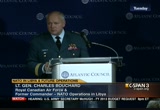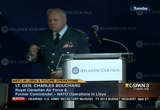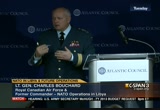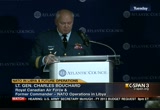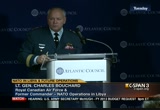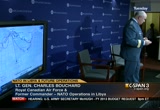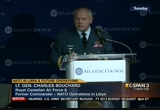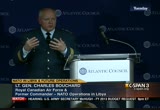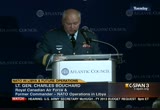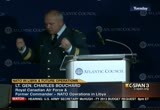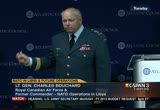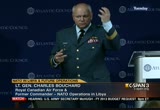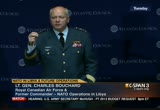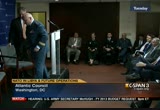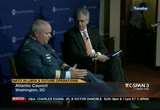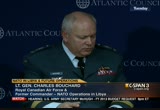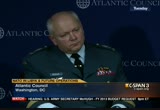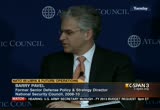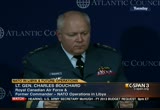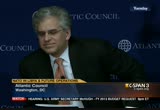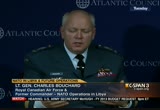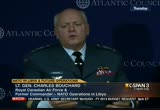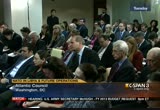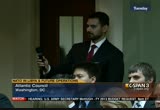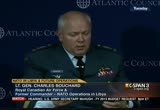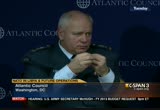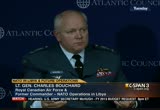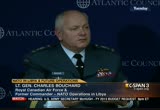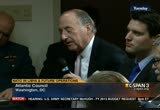tv [untitled] February 17, 2012 6:30pm-7:00pm EST
6:30 pm
told their component, and in fact many others, is that we will not have to go through -- i do not want to have to go through event where we find ourselves that we shot the wrong bus, we shot the wrong thing, so i want -- we're going to have to be very specific as to how we do it and what we do. and we referred to it in many ways as courageous restraint. because if you're an airman, to bomb a place -- it's technically possible and it's not that difficult to remain up to date. but to make the hard decision, no, i will not bomb today because i do have all the conditions that we have, and we are under the directions of zero civilian casualties in the nearby activities. so it became very important. these were the three examples i kept with me throughout the campaign. so we continued with the decision, what would we hit and when would we hit it and how would we hit it? because we went through this process where school was in, school was out, and school was being used as rally points and
6:31 pm
concentrated forces for rthe regime. then ramadan came in, and it was a respected event for the iraq people, and we respected that. then school came back in again and it became important to understand these points. so we put all of these factors together, and for me that was the art of war, was putting it all together skpchlt th. and then handing it over to the targeting expert, the right fusing, the right approaches and all that. let me give you an example. battles of via was a place inside tripoli. the regime timed that it was full of civilians who were acting as human shield for gadhafi and his regime. if you look at the tape, you'll
6:32 pm
find that a lot of the guards were not looking outward to keep people from looking in, they were looking inward to keep people from going out. to keep people busy right inside the main bunker, they created an amusement park, there was a carousel, a bouncy park and all that. we observed they would actually leave this amusement park and watch a movie about 50 meeteter down the road, and this would allow us to hit the bunker. that's the kind of study that our opposing team and our targeting team did. we watched a soccer game take place for two hours, because right around two vehicles, and we waited for the game to break out and went in to instruct. put this all together, and inside a coalition, each nation also has a sovereign, right, and sovereign responsibility to act
6:33 pm
in accordance with international laws and also their own laws. so we would find ourselves with certain nations being uncomfortable with certain targets. that never bothered me. what was important was that all of the targets were addressed as necessary, and we found ourselves here again having a more collegial approach to it ask understanding why certain nations would not do certain things, i think, san important point, because everybody in the alliance has a vote, and i think it's important. at the end, complex target methodology allowed us to minimize collateral damage and optimize this art effect ta we were after. i talked i'm going to talk about the numbers game, because at the beginning we went through -- and we've seen this before somewhere else. how many tanks did you kill today? how many tanks were destroyed? how many tanks did they have total? we are an effects-based
6:34 pm
business, and what i meant by that was the number of tanks is in material. the number of targets destroyed is in material. it's the effect that civilians are still dying is really what's important here. and this is where we stop counting tanks, we stop counting artillery destroyed. we actually looked because as long as there was one artillery, one tank, we were not achieving the effects that we were given. i also learned that from the other perspective which was in nato. when you ask the forces, you actually ask them in terms of numbers rather than effects, which is interesting. in our case, we would have up to 80 jets available or 80 fighter aircraft available, but the saudis would not allow us more than 50 or 60 a day. this is 100 kilometres with 40 to 50 saudis a day. what do you do?
6:35 pm
you prioritize. prioritize where civilians are at risk first, and working on the center of gravity in the command control sites and also ensuring that the weapon storage weren't used to feed the fight further. and we prioritized that and we work it. but really, what i'm getting at is an effects-based operation. an effects-based operation works well for some cultures. effects base is about giving a mission, a kmarnds' intent and you let people go through. but some cultures are not comfortable with that. they prefer to be told exactly what is required of them. and here again, i'm in the effects-based business. i would give effects, keep the port open. how you do it is your responsibility. and really, to me, there was a difference between operational level command, which is the what and the how are the component commands to do, and it worked very well. i think it was patton who said give your people clear direction and watch them do it.
6:36 pm
you'll be pleasantly surprised, and to me that's exactly what it was. give them clear directions and get out of the way and let people get on with that. effects-based operation. but it's not something that every nation can be comfortable. under nato, also the concept of comprehensive approach is one where the acronym political military economic social infrastructure information. these are all aspects. it's clear to me from the start the military campaign, we could control a limited aspect of the military since we did not control or have access to the libyan people on the ground. but it's important to understand, what are the political objectives? what were the objectives of the surrounding countries and what were the objectives and political interest and concerns of the people that are part of this alliance? it's really important to understand that and again, processes are nice but push them aside and try to understand,
6:37 pm
what are the economic points? 65% of the oil export of libya is from the east. you can see the strategic importance. it was for libya to regain this territory. it became evident for us that it was a point to note as well and to understand. same thing with the social. i talked about ramadan, and i talked about the regional differences between each region out there, and to me, these are the points that must be understood, and it's important to understand that. i talked to you about the infrastructure. it's important what you leave behind is still workable. communications most important aspect of it. if there's something i would do better today was to learn more about each cultures of each of the nations that were part of it.
6:38 pm
inside nato, within nato, and also of our partners and allies and of the people of libya. and once you understand why people are doing things, it's a lot easier than to get on with it and to find a way for everybody to work together. that's probably the biggest point that i had from that. i communicate a fair bit with my chain of command as well and with the nations, and it was important, here again, to exchange, not that i did what the nations wanted as much as i needed to understand the nations interest in how do they affect the accomplishment of a mission to protect civilians. and i think it was important. 50% of this campaign was kinetic, in my opinion. the other 50% was non-kinetic. strategic communications, national affairs are important.
6:39 pm
strategic communications is more than what you're going to tell the press. it's what are the key messages and who are the audiences? and you need to understand that. what are the audiences inside libya? the tmc, the regime forces and the mercenaries themselves. what were the interests outside nato and the world itself? because the credibility of nato was at stake as well here and it's important to put it all in perspective. public affairs, simple point, tell the facts. stick to the facts and pass them. the other side, the regime used the press in many ways to provide misinformation and we never got in the business of arguing with them. we just stuck to the facts and i think it paid off in the end. the only other points, i'll talk about that as well as psychological operations, is how do i talk somebody else into stopping what they're doing without using force to do this?
6:40 pm
and here again, we drop leaflets. in fact, we dropped over 9 million leaflets out there, and it was to reach some of the population. we could have reached them many other ways through social networks as well. how do we get into a future battle space where people are talking on skypes, they're reading facebook and myspace and talking to each other and passing on youtube and the like? and perhaps -- i think there are places here where we have lots to go. agility of the mind is the last point, and attitude is everything. leave your ego at the door and learn about each other, and really remain agile. don't let process get in your way. and what may seem to some as i don't understand what they want, we well, if you don't understand and they don't tell you, produce it, this is what i read back to
6:41 pm
you. let me read back to you what you've just told me or what i understood you are trying to tell me, and it works at the personal level, it works at the international level as well, and that's the point i'm trying to talk about or the point i'm trying to make here, agility of the mind. soday, we had three key tasks, the protection of civilians, the embargo and no-fly zone and i believe we met those three with success. but the victory belongs to people of libya. this was a libya and libyan people victory. they're the one who fought for it, they're the ones who earned their victory. i think libya today is positioned, and we can cover that in the question periods, perhaps, as to the future and what will happen. and how do we understand their journey to a libyan democracy? and i do say libyan democracy. i think it's important. for nato it was a success.
6:42 pm
i believe we validated the strategic concept and the need for rapid response to our crisis. and it can be done. it can be done, and i think today i see many improvements as people go there. finally, we've made some new partnerships. from a military perspective, i think we need to continue to work on military cognizance. we need to link these together and be able to talk to each other as partners into an alliance. bautz because a lot of our national systems, because we have lots of stovepipes and we have to build new systems to bridge these points, and my point to the makers of these systems is i don't need translator boxes that will take various languages or various classifications, i need multiple language systems that i can jump back and forth while allowing them to have their own
6:43 pm
privacy and secrecy. i think we've learned that it's smaller bombs that we require. we need precision-guided ammunition with low collateral damage effects. we need to be able to link eef other and we need to continue to develop leaders that will understand and understand about military operations that are more than just giving orders. it's about interrelations with people, understanding their culture and understanding their weakness and strength, capitalizing their weakness, minimizing their strength and to get everybody to work together. that's where the strength of the alliance is all about, that everybody works together. let me close with a final word from a personal perspective about leadership. a friend of mine had passed away a few years back defined leadership as the art of telling people to go to war -- to go to
6:44 pm
hell, rather, and have them look forward to the trip. my perspective on the leadership aspect at the operational level is the kindergarten rules. there are three major kindergarten rules that you should work with. one is you need to get along with everybody in the schoolyard, second is you need to share your toys, and the third is don't forget to take naps in the afternoon. ladies and gentlemen, that completes my presentation. thank you, sir. am i on schedule? [ applause ] >> well, thank you, general, for not only excellent remarks but also really interesting and really important for this audience in particular, which is the policy community, the government policymakers, et cetera. i have about ten questions to ask you, but i would like to ask you one, which i thought was a new characterization that i
6:45 pm
heard in your remarks and then we'll open it up to the audience. you characterized the handoff of odyssey dawn to a hail mary prote protecter as a pass. did that have any relationship to the obama administration's overall strategic approach to this mission to unify protecter as certainly playing a role, or as one white house official put it, leading from behind? can you just talk about that transition a little bit more? >> well, from my perspective, i think it was important as a global community to have nato take the lead in this operation as quickly as possible. he had the international legitimacy to provide it through the u.n. security council, nato had voted unanimously to proceed with this and we were told, get on with that. so to me it was to become more inclusive and come together. time became the essence and we wanted to move as quickly as
6:46 pm
possible to show that nato could actually take this mission and take the lead from that. so we pushed a limit. to me, there will never be a commander that will tell you he's ready or she's ready to take over this mission. they'll always want a couple more weeks, and at some point you go, no. shoot the puck, as we say, and you get on with it. and we did. i think it was an important part. it was important for the nations of nato, for the partners to be inclusive and as quickly as possible build their alliance. you did allude to certain expressions, and one of them was lead from the rear, and i'm not sure if i share the approach to this. my approach to it is actually the united states played a big role to this mission. the united states' role was to provide capability, unique capabilities, and capacity that does not exist inside nato.
6:47 pm
and they did that. also, at the leadership level, a u.s. admiral, my commander, admiral locklear, is a u.s. admiral, so i think this was an international team put together. so i'll imply to you i think everybody played a role, albeit in this case the u.s. opted to be more balanced in its approach, and, in fact, give the tasking of leadership and cooperation to the broader nato community. >> thanks very much. i'll ask one more question and then we'll open it to the audience. we had the administration put its budget to our congress for fiscal year 13 yesterday. it includes a significantly new approach to the feds' strategy. we heard about the strategy last month. we have some of the numbers now, the investments in a
6:48 pm
much-reduced defense budget for at least the u.s. military. if we had to do another libya, and there's other defense budgets also suffering from significant cuts. if we had to do another operation of this sort, do you think we could do it again? especially if the cuts continue? where doour you think the thresd is for putting a coalition together doing an operation of this sort, which is largely an air power operation but also heavily relying on neighbors for surveillance, concentration, tankers, et cetera? >> most valid question. difficult to quantify when we look at the various nations. but i think, as we look at all of our national issues, whether it be the national debt, being the economy, being the euro, the standing of the euro and the eu, all of us are facing financial challenges. and, therefore, to me to drives
6:49 pm
us to see that alliance warfare is the right way to go because it's about cost sharing, it's about risk sharing, and it's about working together. but with that comes also the need to understand that alliance warfare also is a more cleollegl way of doing business, and in some places it may take a little bit more time. but the results can be accomplished in the same way, and, in fact, it's probably not a bad thing to listen to what the others have got to say put together. so could the alliance put another mission like this together? absolutely. in terms of capabilities, in terms of knowledge. as far as the sustainment and the scope of it, i think the future and the economies of the various nations that are a part of nato will dictate that. but i think we also need to take a look globally at nato capabilities and decide what should reside within nato, each
6:50 pm
countries, and are there any capabilities that do not need necessarily to be duplicated from one nation to the other. but are some nations that are suited for certain interests and others for certain activities, and try to find, through this alliance, a way to operate together and share the responsibility, share the costs, and share the risks. >> thank you very much. >> to the floor now to see if there are other questions for general bouchard? yes, in the third row. [ inaudible question ] >> i was wondering if you could speak a little bit more to the lessons learned with regard to coalition inop rabibility and cd-isr systems networks and platforms. how well did we work together with data link and communications in the actual operation environment? >> many of the systems in the network are developed on a national basis. each of us have got a national
6:51 pm
industry that needs to be supportive. and the difficulty is that many of these national systems are developed to suit national requirements, and not necessarily alliance requirements. so the communication from one system to the other can be difficult. i had a canadian system. i was aware of u.s. systems. the british systems and the like. and then you have nato systems, but even the nato system need to mature even further. we need to go beyond this. the technology in terms of link, in terms of exchange of information, data link, and transfer of information is a place where we need to continue. but it's a difficult part because on one side you have -- you're facing national interests and national requirements and on the other side are alliance requirements. and therein lies the difficult part. where do we find that balance between those two -- those two end of the spectrum, to find the place where we can work.
6:52 pm
i think it starts at the policy level, where we agree -- i don't know if the military structures, we all agree we need to talk to each other. we can probably all find out some way but there has to be a policy architecture that nations will drive to, that will provide them a place to go that ensures interopperability. it applies to not only cp-isr, it applies to movement of airplanes, movements of ship, transfer of data, transfer from nations, logistic systems. it applies across the board, how do we find a way to do this? and it's not simple. nato has been run for quite awhile, and we're still struggling through many of those, and at one point, one has to accept that for the good of at liance, you may have to form -- to create a system that -- that will be able to operate either cost a little bit more, or not have the full capabilities that perhaps you
6:53 pm
were waiting for, or hoping for. or if you do, as i said, we need to create systems that are mu i multi-lingu multi-lingual, not create boxes that can translate from one system to another. and we're not there yet. so it's a difficult part. and it's something that needs to go, but see right from the start, you can work it from the bottom. we've seen this in afghanistan, with the afghan mission system network, but it also requires that umbrella on top and that policy framework where people -- gives a place for people to go to, and to put these two together. and to find a workable solution. >> question from the last row in the far corner there. >> thank you. my name is mix caliam. historically, military commanders charged with protecting civilians have had an extremely difficult time swerpting that mandate.
6:54 pm
generally because it doesn't necessarily imply or clearly imply a particular end state, political end state, and set of goals. you mentioned some of the analysis you did, and particularly your mention of the center of gravity for the regime and different kinds of targets. implying that you obviously did go through quite an extensive analysis and come to some conclusions about what, at least some intermediate end states would be required to achieve the mandate. could you walk us through some of that analysis? very complex, and it's -- it's really trying to understand, first of all, what has happened on the ground. and what are the tactics being used. who's using them. how are they using it. bit but the most important point is the effects at the end. is there still violence going against civilians, working your way back from that. for us it was nearly impossible.
6:55 pm
control systems on the ground, and clear understanding of the full picture on the ground, it was very difficult to get involved in that close engagement. but, this is where we said our value will come from engaging long-range weapon systems. artillery, rockets. large concentrations of troops are being moved forward. the logistic strain, that must be the disorganization. and also the centers, be it communications, command and control, logistic centers. and we formed a team together on that and this is where also became important, as i said, nger based on a clear understanding, how does this relate to our mission? that responsibility that we have to protect the our action. and if you could not draw those links, clearly, we -- we went back, we assessed it, and we defined the problem a little bit
6:56 pm
more. but we set those standards to make sure that exactly we stayed within our mandate, and that was the most important point. never once did i -- did i consider that we were straying anywhere outside. we stayed well inside the mandate. but also to us more than military minds. it's more than target terrorists. it's more than weaponeers. it's also cultural. it's also political. it's also legal. perception. our own perception, and that bond of trust that you're trying to develop between the people m still have trust and respect in to the actions of nato towards th and this is where the team becomes -- and you have to be very collegial about this and allow everybody to do this. th part of an alliance, where you reiv knowledge from many partners. we look at the world differently
6:57 pm
and their views will help you understand. i spend a lot of time talking to our cultul customs of that country. and what would it be if we weren't that part. and how do we stop the population from suffering, from being tarlgated, from being -- not troided with electricity, with water. aspect of it, as well, because it's more than just a kinetic action against a population. but also all those other parts of it, running the satellite to find out where the electricity is. what part of the country has or does not have water. what is the flow out there? and how does it work? and this is where the team got together worked at this, and much of my advisers were those political advisers, policy advisers, legal mh getti team together, and play it, give direction, play it, and then at one point every day we would
6:58 pm
make those decisions as to what will be engaged, what will not be engaged. what we need to develop further to understand and what do we need to do to achieve the mission we were given. and the linkage to that. so it is a process that we developed. it went a little bit outside the doctrine because our mission was not to search and destroy someone. it was to protect a population. so, there's a shift in there to how you approach this concept. and how work it so far us, this was the part and this collegial approach, and i know sometime for military commander, talking about collegial approach doesn't sound right. well, it does. it does. it's about, as i said before, the political, the military, the social, the cultural aspect. economic aspects. the infrastructure. understanding all of this. and to me, that's the essence of being able to run this kind of mission, especially in the protection of population. rather than a more conventional
6:59 pm
approach to combat. >> yes, in the front. >> general, i ask emphasis on old, an old professor from national war college what had you, in your career, at this particular assignment, was it true the canadian system of military education war colleges, was it through conversations with guys like chuck honor or mike shureck, war games, did jim hold seminars? because you display a phenomenal bringing together collection of necessary skill sets, the skill sets to do this in a very effective way that necessary necessarily is the norm. so i wonder when you look back at your language and distinguished career what real i empowered you most or gave you the thought power, and as you talk about the mental agility, for this particular assignment? >> thank you for your question. throughout this operation i had
154 Views
IN COLLECTIONS
CSPAN3 Television Archive
Television Archive  Television Archive News Search Service
Television Archive News Search Service 
Uploaded by TV Archive on

 Live Music Archive
Live Music Archive Librivox Free Audio
Librivox Free Audio Metropolitan Museum
Metropolitan Museum Cleveland Museum of Art
Cleveland Museum of Art Internet Arcade
Internet Arcade Console Living Room
Console Living Room Books to Borrow
Books to Borrow Open Library
Open Library TV News
TV News Understanding 9/11
Understanding 9/11